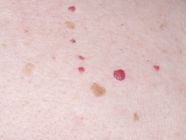Measles is not just a simple rash; it is a highly contagious viral disease that can lead to serious complications, including death. Measles complications are more common in children under 5 years old and adults over 30 years old. In 2022, around 136,000 people died from measles, most of them children under five, despite the existence of a safe and effective vaccine against the disease.
However, it is important to note that global vaccination efforts have made tremendous progress in reducing measles-related deaths. Between 2000 and 2022, measles vaccines helped prevent 57 million deaths. (1)
What Are the Symptoms of Measles in Children?
Symptoms of measles typically appear 7–14 days after exposure to the virus. They usually begin with cold-like symptoms, such as: (2)
- High fever (can exceed 40°C)
- Cough
- Runny nose
- Red, watery eyes
2-3 days after the onset of symptoms, Koplik spots may appear. These are small white spots that appear inside the mouth.
After 3-7 days or sometimes longer, the measles rash appears: (1) (2)
- It starts as flat red spots on the face, along the hairline, and behind the ears, and then spreads down over 3 days to the rest of the body, including the neck, torso, arms, legs, and feet.
- Small raised bumps may appear on top of the flat red spots.
- The spots may merge as they spread from the head to the rest of the body.
- The rash does not cause itching.
- When the measles rash begins, the child’s fever may rise above 40°C.
- The rash typically lasts for about a week before fading.
What Should I Do If My Child Shows Symptoms of Measles?
If your child shows symptoms of measles: (3)
- Stay at home: Keep your child at home to prevent spreading the infection. Do not send them to daycare or school, and avoid going to work yourself.
- Contact the doctor: Call your pediatrician immediately to determine whether an in-person examination is necessary.
- Avoid going directly to the clinic: Do not take your child directly to the doctor's office. Call ahead and inform them of the possibility that your child may have measles to prevent spreading the infection to others in the waiting room.
Why Is Staying at Home Important?
Measles is one of the most contagious diseases in the world. Nine out of ten people exposed to the virus will become infected, especially if they have not been vaccinated, have never had the disease, or have weakened immune systems. Even brief exposure to an infected person in the same location is a major risk for those who have not been immunized. (3)
How Does Measles Spread?
- A child with measles is contagious to others 4 days before the rash appears and remains contagious for 4 days after the rash appears.
- The disease spreads primarily through respiratory droplets expelled when an infected person coughs or sneezes. These droplets can be inhaled by others, and the virus can remain active in the air for up to two hours, which means a person could contract the disease even without direct contact with the infected individual, simply by being in the same room previously occupied by the patient.
- The virus can also live on contaminated surfaces for up to two hours. For example, it can spread to another person if they touch a surface contaminated with the virus and then touch their face, mouth, or eyes. (3)
What Are the Complications of Measles in Children?
Measles can cause serious complications in children, especially those under 5 years old, such as: (2) (4)
- Ear infections: Affect about 1 in 10 children with measles.
- Diarrhea: Occurs in less than 10% of cases.
- Pneumonia: One of the most severe complications of measles and the leading cause of death from measles in young children. About 1 in 20 children develop pneumonia due to measles.
- Encephalitis: A rare but extremely serious complication affecting about 1 in 1,000 children. It can lead to seizures, hearing loss, and intellectual disabilities. Among children who develop encephalitis, approximately 4 in 10 will have permanent brain damage.
- Death: Measles complications, especially respiratory and neurological, can lead to death. It is estimated that 1 to 3 out of every 1,000 children who get measles will die from these complications.
For This Reason, Health Organizations Emphasize the Importance of the Measles Vaccine (MMR), which is included in the vaccination schedule for children in most countries.
How to Care for Your Child?
There is no specific treatment for measles in children. What your child needs most is rest at home, drinking plenty of fluids, and taking fever reducers. If you notice your child's condition worsening or the appearance of severe symptoms, contact the doctor immediately to protect them from any serious complications. (4)
Most children recover from measles within 2-3 weeks.
With Al-Ahli Hospital, Your Child's Health is Our Top Priority. Contact our Pediatrics Department for specialized medical care and to protect your child from any serious complications.
References:
- WHO - Measles
- CDC - Measles Symptoms and Complications
- HealthyChildren - Measles: What Parents Need to Know
- Pregnancy Birth and Baby - Measles in babies and children






